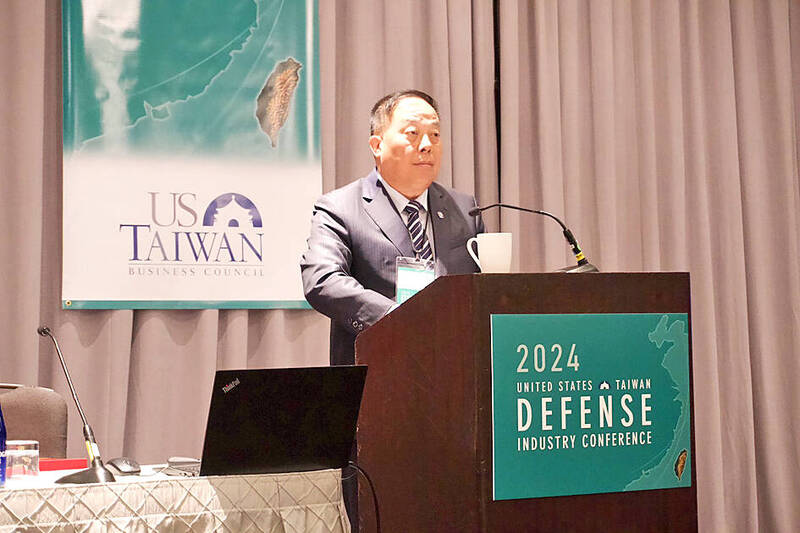《TAIPEI TIMES》 US is urged to engage in joint weapons production

Vice Minister of National Defense Hsu Yen-pu speaks at the US-Taiwan Defense Industry Conference in Philadelphia, Pennsylvania, on Monday. Photo courtesy of the Ministry of National Defense
NEW INITIATIVE:Washington is launching the Partnership for Indo-Pacific Industrial Resilience with at least 12 allies, including Taiwan, to address supply chain constraints
/ Staff writer, with CNA, PHILADELPHIA
Vice Minister of National Defense Hsu Yen-pu (徐衍璞) on Monday urged Washington to engage in joint or licensed production of weapons with Taiwan, and to allow allies to provide Taiwan with substitute arms for weapon systems it has bought, but which have not been delivered amid supply shortages.
In his keynote speech at the US-Taiwan Defense Industry Conference in Philadelphia, Hsu said that Taiwan has never forgotten that it is responsible for its own safety, and called on the US and other allies to help hasten the development of weapons production.
Hsu listed several arguments for integrating Taiwan into the US’ “defense supply chain,” such as Taiwan’s high-tech arms industry, professional talent, and emphasis on confidentiality and occupational safety.
Hsu added that he hopes the US would allow Taiwan to join nations such as Japan and Australia in engaging in joint or licensed production of parts and components needed for F-16 jets and drones, thereby helping Washington expand exports of these defense products to its allies.
As US laws on technology transfers involve significant bureaucracy, which has caused delays in Taiwan’s acquisition of core technologies or parts necessary for developing weapons, Hsu said he hoped that Washington would revise the relevant laws and regulations to simplify procedures.
Although Taiwan’s arms industry attaches great importance to developing main systems independently, it relies on the free market for the manufacturing of subsystems and critical modules, Hsu said.
In addition, Hsu said that Taiwan hopes to create a common operational picture with the US to increase compatibility between weapons systems and other military equipment on both sides.
For example, the US could use datalinks to transmit the coordinates of enemy targets to Taiwan’s intelligence systems, boosting Taiwan’s target acquisition ability, Hsu said.
Hsu also said that Washington should ask its partners to give Taiwan weapon systems with capabilities analogous to US-made arms when the latter cannot be delivered.
Taiwan’s request for US partners to alleviate logjams is a clear signal that any assistance that helps the nation defend itself would be welcomed, Hsu told reporters after the conference.
Taipei and Washington are working closely to enable the joint production of certain arms, he said, adding that arrangements to give Taiwan access to key technologies are under way.
Meanwhile, a US defense official told a closed-door meeting during the forum that the US commitment to Taiwan is “rock solid” and Washington would continue to maintain Taiwan’s self-defense capabilities per its obligations under the Taiwan Relations Act.
The Taiwanese legislature’s approval of the defense budget would be crucial for the US to achieve its goal of assisting Taiwan’s defense, US Principal Deputy Assistant Secretary of Defense for Indo-Pacific Security Affairs Jedidiah Royal was cited by an anonymous source as saying.
According to the source, Royal said that President William Lai (賴清德) has prioritized social resilience after assuming office amid a surge of threats from China.
Lai’s creation of the Whole-of-Society Defense Resilience Committee was heartening to Washington, he said.
Royal said that Washington would soon launch the Partnership for Indo-Pacific Industrial Resilience (PIPIR) with at least 12 of its allies in the Indo-Pacific region and Europe, including Taiwan, to address supply chain constraints regarding weapons.
He said that the US would chair an inaugural meeting of the PIPIR in Hawaii in two weeks.
The initiative is expected to begin collaborations with US allies, including Taiwan, to address “defense industrial base vulnerabilities” by fast-tracking the production of weapons systems, a source who attended the event quoted Royal as saying.
Royal underlined the importance of collaboration with the US’ Indo-Pacific allies, citing as examples its projects with Japan to jointly produce missiles and with India to coproduce fighter jet engines, the source said.
Royal said a US trade mission of 20 companies is in Taiwan seeking uncrewed aerial systems (UAS) and counter-UAS business opportunities, which is a crucial step in helping Taiwan develop its indigenous manufacturing capacity in such systems, the source said.
Meanwhile, Taipei City Councilor Vincent Chao (趙怡翔), who represented the Democratic Progressive Party at the conference, highlighted the need for cooperative action to remove barriers for democratic nations to sell weapons to Taiwan.
So far, only the US is willing to sell weapons to Taiwan, but many advanced weapons systems are jointly developed by the US and European nations, Chao told reporters.
If Taiwan cannot overcome obstacles in securing foreign technology transfers or arms sales from other nations, it would pose a challenge to Taiwan’s efforts to strengthen its defense, Chao said.
Chinese Nationalist Party (KMT) Legislator Hsu Chiao-hsin (徐巧芯) said that her party’s stance on Taiwan’s defense budget had been “misrepresented.”
The KMT is not attempting to block the defense budget, but believes it should be strictly reviewed so that government funds are used on the most urgent items, Hsu told reporters at another forum.
The KMT is open to further increasing Taiwan’s defense budget, but believes that the US should first address delays in delivering weapons that Taiwan has purchased, she said.
According to a recent report released by the Cato Institute, the value of the backlog of weapons that the US has sold, but has not yet delivered to Taiwan stands at US$20.53 billion.
Taiwan People’s Party Legislator Vivian Huang (黃珊珊) said that her party was in favor of increasing the defense budget, but would strictly review the Ministry of National Defense’s requests to avoid wasteful spending.
Additional reporting by Jonathan Chin
新聞來源:TAIPEI TIMES
















